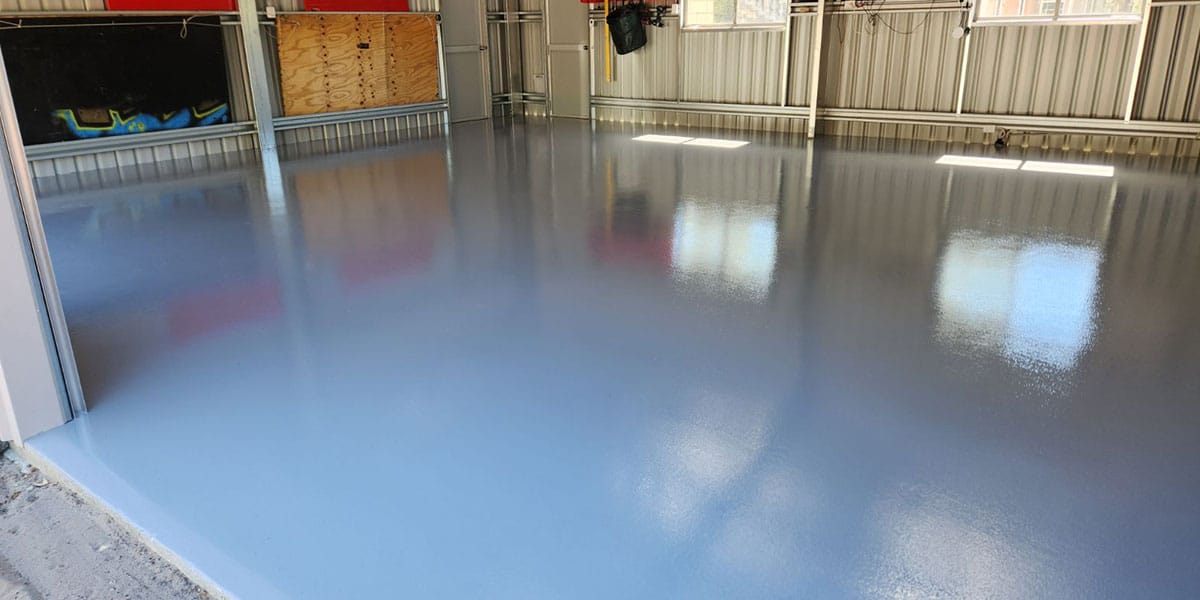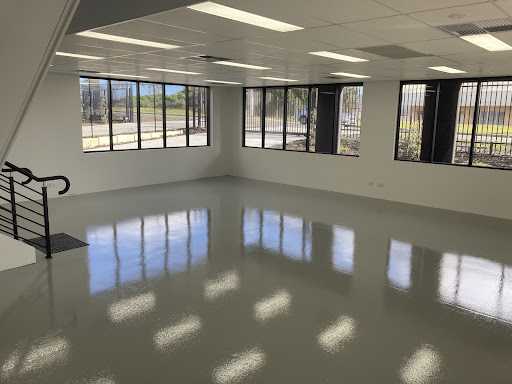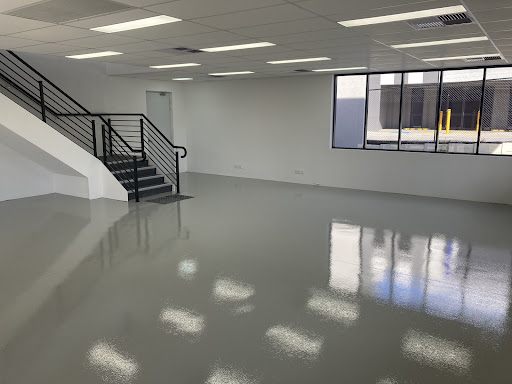Achieve Optimal Performance With Durable Workshop Flooring Perth
Durable Workshop Flooring
Choose PM Industries for your shop! Our Perth team are skilled in workshop flooring solutions to suit your particular situation.
No matter whether you need strong epoxy coatings, heavy duty slip resistant paints or something else, we’ll design your floor to make it look better than new.
We’ve got the toughest flooring on the market that will last you a lifetime. We offer professional installation and competitive rates, along with a dedication to superior customer service.
Impress your clients with quality flooring in Perth. Call now for a quote and give your workshop new purpose; allow it to be safe, secure, and good looking.
How do I know if I need a new flooring?
You should get a new floor if:
Free Quotes Within 48 Hours
- Wear and Tear: If the current flooring in your workshop has experienced a lot of wear and tear, cracks due to heavy machinery or equipment – it’s time for an update.
- Safety: It can enhance safety by slip-resistant surfaces, and help to prevent accidents.
Aesthetic - Improvement: If you are looking for an opportunity to improve the aesthetic appeal of your workspace in order to look more professional or impress potential clients, your workshop flooring can help.
- Better Durability: Can withstand weights, chemicals as well as regular footsteps much better than traditional concrete floors.
- Compliance: Many industries require certain types of flooring in order to comply with regulations i.e. chemical resistance or electrostatic discharge protection.
- Simple Maintenance: It can help make cleaning and maintenance very simple to save you time.
Speak to an expert today if you would like to find out how much it would cost for your situation and whether epoxy floors are the right choice for you.

What factors affect workshop flooring costs?
The price will also greatly depend on several factors, like the material of flooring you choose, the size of your workshop, how complicated installation will be and if you receive any extras or custom work.
These are some important aspects to notice on:
- Size and Structure of Floor: A big floor size will call for extra materials and manpower. The design of the workshop, and if there are any special shapes or corners can affect how difficult and expensive an installation may be.
- Existing Floor Condition: Any floor requiring extensive preparation crack repair, leveling, diamond grinding or removal of existing flooring costs will add to overall cost.
- Flooring Material Type: Different materials have varying price points when it comes to flooring type, epoxy floor, polished concrete seem to be favourite for their durability and chemicals/stain resistant qualities.
- Customisation and Design Aspects: Custom features such as tinted epoxy colors, decorative colored chips or even plain patterns can make the workshop more appealing but are additional expenses. The intricacy of the pattern and volume of colours will determine the price.
- Material Quality: Superior material quality comes with a higher price tag, but generally results in better durability and longer service life—in short, exactly what you need when faced with constant use like that found in a workshop.
- Cost Of Labor: Experienced workers may cost more, but produce a better finish and a longer lasting product.
- Time to Install: One type of flooring may be faster-to-install, but can they stand up to cure-time versus if the installation takes more time and will have a better bond.
- Location: The region in which the workshop is held may affect costs, for example with issues of accessibility for transportation of materials and local wage rates.
- Project Difficulty: Obstructions, machinery, or working around when you are open for business that make things difficult can also complicate the project and drive costs up.
- Aftercare and Maintenance: Certain flooring options may be more demanding in terms of maintenance or need a certain treatment every now and then. Although these may add to the initial expense, they can help increase the durability and look of your floor.
It’s also important to request quotes from local flooring contractors so you can get a better sense of your project costs. Take into account variables like prep work, labour, and any additional features you might be interested in that could affect the final price.
How long does workshop flooring take to install?
The number of hours required to finish a new floor can differ according to many elements, such as the type of flooring material you use, your first floor’s size or the layout and complexity of installation.
An approximate bearing of different flooring options:
- Epoxy Flooring: Epoxy floor coatings can usually be applied in a few days to a week, depending on the size of workshop and number of coats. There may be an additional cure time added to the above mentioned delivery hours/days times.
- Concrete Polishing: If you are going to polish the concrete floors, it may be a week or two longer due to grinding and polishing and curing.
- Rubber Flooring: Rubber flooring is a quick installation, generally two days or less – but these times vary depending on the layout.
- Tiles or Interlocking Mats: Installing interlocking tiles is typically a faster process, and you can normally get it done in the span of a day or less if your workshop space is not very big.
- Specific Flooring Needs: If a special treatment and/or feature is need, for example, non-slip floors or chemical resistance treatments, the time could extend based on the application details.
Certain factors can make this time shorter or longer, so best thing is to discuss with your Perth flooring company and get a rough idea of how long it will take for you.
Things such as the surface preparation to prepare parts for painting or coating, drying and curing times as well as final finishes can add more time accordingly.
Your contractor may need a little lead time, so planning and communicating the timeline early in the game would be helpful to ensure an installation that works with your schedule and needs.
How can I identify professional workshop flooring installer?
Local professional installers are ready to work for you. Below are a few things that will help you spot a good and experienced flooring professional.
- Portfolio: Request a portfolio or samples of their work. A professional flooring company will have an online portfolio that display images of diverse projects that they have undertaken and this can provide you with a feel for their expertise.
- Licensing and Certification: Always ensure that the company is licensed and certified with the required qualifications for flooring services. This way, they are able to comply with industry regulations.
- Insurance: Ensure the company is properly insured. This is to protect you and all of the workers in case something goes wrong during installation, there are any accidents or something gets damaged.
- Pricing: They give transparent quotes and have no hidden charges. Be suspicious of companies with opaque pricing.
- Communication: Professionalism extends to communication. They should be attentive, have the answers to your questions and generally keep you apprised of the progress on the project.
- Warranty: Find out what kind of warranty is guaranteed for their work and materials. If they truly are a reputable service, they will want to back up what they sell.
- Safety Precautions: Ask them if they practise safety during installation (as this is especially important if you have your own safety requirements in the workshop).
- Timelines: They must give realistic timelines for the project and stick to these schedules.
- Contract and Terms: Be thorough in reading through the contract so that you understand what materials are being used, all costs, how long certain phases of the project will take.
With these factors in mind, and doing some research, you can select a professional workshop flooring supplier in Perth to help meet your requirements and deliver a good job.
Frequently Asked Questions about Workshop Flooring in Perth
What is the best floor surface for the workshop?
- Epoxy Flooring: Workshops in Perth make use of epoxy coatings. They are extremely strong, resistant to chemicals, easy to clean and seamless. Epoxy floors are best for heavy equipment and auto workshops where spills are likely to take place.
- Polished Concrete: Polished concrete is low in cost and also it lasts long. It is impervious to heavy equipment, easy to clean and can be personalized with a range of finishes. It’s a popular pick for workshops, where a more industrial look is desired.
- Rubber Flooring: Impact-resistant rubber flooring is comfortable to walk on, which makes it perfect for workshops in which workers are spending much of the day working while standing. It is regularly used in gyms, machine shops and places requiring sound deadening.
- Consider Interlocking Tiles or Mats: Interlocking tiles and mats are flexible and simple to install. They’re made of materials such as PVC, vinyl and rubber, which you can swap out individually it they become damaged. They are ideal for shops with varying layout requirements.
- Painted Concrete: Industrial-grade painted concrete is by no means as indestructible as epoxy coatings are, but it’s an affordable solution for your flooring. It is the clean, antistatic surface that makes it possible to use and maintain.
- Vinyl Floors: They are chemical resistant, easy to clean and have some cushioning for employee comfort. It’s a good choice for workshops that include both office and work space.
- Linoleum: Linoleum is a green option and is also resistant to chemicals and stains. Less traditional for a workshop, but great if sustainability is important to you.
The ideal Workshop Floor Perth has for you depends on the type of work, budget and preference. Keep in mind things as the longevity of the product, how easy it is to clean or whether a flooring cover withstands chemicals and food spillage among other preferences.
The best way is to seek a professional flooring company who can assess your workshop and advice the most appropriate flooring type.
How thick should a workshop floor be?
Typically, a workshop floor is thicker based on the flooring material as well as your level of expected traffic. Important considerations are your load requirements, and the material you wish to apply it over, as well whatever specifics your workshop needs.
Here are few tips for some most used flooring materials:
- Concrete slab: The concrete slab thickness varies depending on factors such as a minimum of about 4 inches or approximately 100 mm. However, the thickness can differ in ultrabound situations and be 4-6 inches or even beyond in industrial situations.
- Epoxy flooring: The epoxy coating is typically multilayered; thus, depending on the number of coats and the thickness of each, the total thickness can vary from 20mil to 30 mil per coat.
- Rubber flooring: Rubber flooring has different thicknesses depending on tiles or rolls. Thicknesses for most workshop rubber floors are likely to be between 3/8 to 1/2 inches or more.
- Interlocking tiles or mats: These can start from as low as 1/4 inch to 3/4, or even more. Regardless of the type of workshop, these should use the best thickness to realize more traffic comfort dampening some levels of sound and insulation.
At any time, the thickness should satisfy the workshop-specific thickness needs, including equipment and machinery weight and the wheel’s traffic followed by other external factors like comfort.
A thicker floor shall have proper resilience and traffic performance at a presented higher price.
The expertise of a professional is therefore critical in optimizing.
Hear From Our Satisfied Customers
The whole team take great pride in their work and the quality cannot be faulted.


